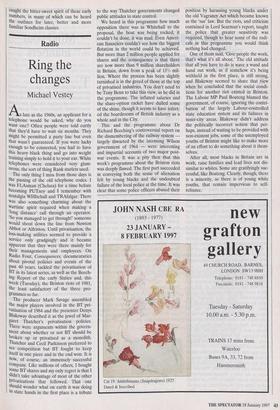Radio
Ring the changes
Michael Vestey
Alate as the 1960s, an applicant for a telephone would be asked, why do you want one? Often people were told curtly that they'd have to wait six months. They might be permitted a party line but even that wasn't guaranteed. If you were lucky enough to be connected, you had to have this heavy black thing and go into weight training simply to hold it to your ear. White telephones were considered very glam- orous, the sort of thing Rank starlets used. The only thing I miss from those days is the passing of the old telephone codes. I was FLAxman (Chelsea) for a time before becoming PUTney and I remember with nostalgia WHItehall and TRAfalgar. There was also something charming about the wartime spirit required when making a long distance' call through an operator. So you managed to get through!' someone would shout down the line from Newton Abbot or Alfriston. Until privatisation, the loss-making utilities seemed to provide a service only grudgingly and it became apparent that they were there mainly for their managements and employees. On Radio Four, Consequences, documentaries about pivotal policies and events of the past 40 years, tackled the privatisation of BT in its latest series, as well as the Beech- ing Report of the early Sixties and, this week (Tuesday), the Brixton riots of 1981, the least satisfactory of the three pro- grammes so far.
The producer Mark Savage assembled the major players involved in the BT pri- vatisation of 1984 and the presenter Denys Blakeway described it as the jewel of Mar- garet Thatcher's privatisation policies. There were arguments within the govern- ment about whether or not BT should be broken up or privatised as a monolith. Thatcher and Cecil Parkinson preferred to see competition but BT fought to keep itself in one piece and in the end won. It is now, of course, an immensely successful Company. Like millions of others, I bought some BT shares and my only regret is that I didn't take advantage of most of the other privatisations that followed. That one should wonder what on earth it was doing in state hands in the first place is a tribute to the way Thatcher governments changed public attitudes to state control.
We heard in this programme how much opposition there was in Whitehall to the proposal, the boat was being rocked, it couldn't be done, it was mad. Even Ameri- can financiers couldn't see how the biggest flotation in the world could be achieved. But more than 2 million people applied for shares and the consequence is that there are now more than 9 million shareholders in Britain, down from a peak of 11V2 mil- lion. Where the process has been slightly tarnished is in the greed of those at the top of privatised industries. You don't need to be Tony Benn to take this view, as he did in the programme. The inflated salaries and the share-option racket have dulled some of the shine, though it seems to have infect- ed the boardrooms of British industry as a whole and in the City.
This and the programme about Dr Richard Beeching's controversial report on the dismembering of the railway system largely thwarted by the incoming Wilson government of 1964 — were interesting and impartial accounts of two major post- war events. It was a pity then that this week's programme about the Brixton riots was deeply flawed. The first part succeeded in conveying both the sense of alienation felt by young blacks and the undoubted failure of the local police at the time. It was clear that some police officers abused their position by harassing young blacks under the old Vagrancy Act which became known as the 'sus' law. But the riots, and criticism contained in Lord Scarman's report, taught the police that greater sensitivity was required, though to hear some of the radi- cals in this programme you would think nothing had changed.
One of them said, 'Give people the work, that's what it's all about.' The old attitude that all you have to do is wave a wand and hand out work, as if somehow it's being withheld in the first place, is still strong, and Blakeway seemed to share that view when he concluded that the social condi- tions for another riot existed in Brixton. The Labour MP Paul Boateng blamed the government, of course, ignoring the contri- bution of the largely Labour-controlled state education system and its failures in inner-city areas. Blakeway didn't address the politically incorrect notion that per- haps, instead of waiting to be provided with non-existent jobs, some of the unemployed youths of Brixton might like to make more of an effort to do something about it them- selves.
After all, most blacks in Britain are in work, raise families and lead lives not dis- similar to whites. Some are gratifyingly suc- cessful, like Boateng. Clearly, though, there is a minority, as there is of young white youths, that remain impervious to self- reliance.


























































 Previous page
Previous page